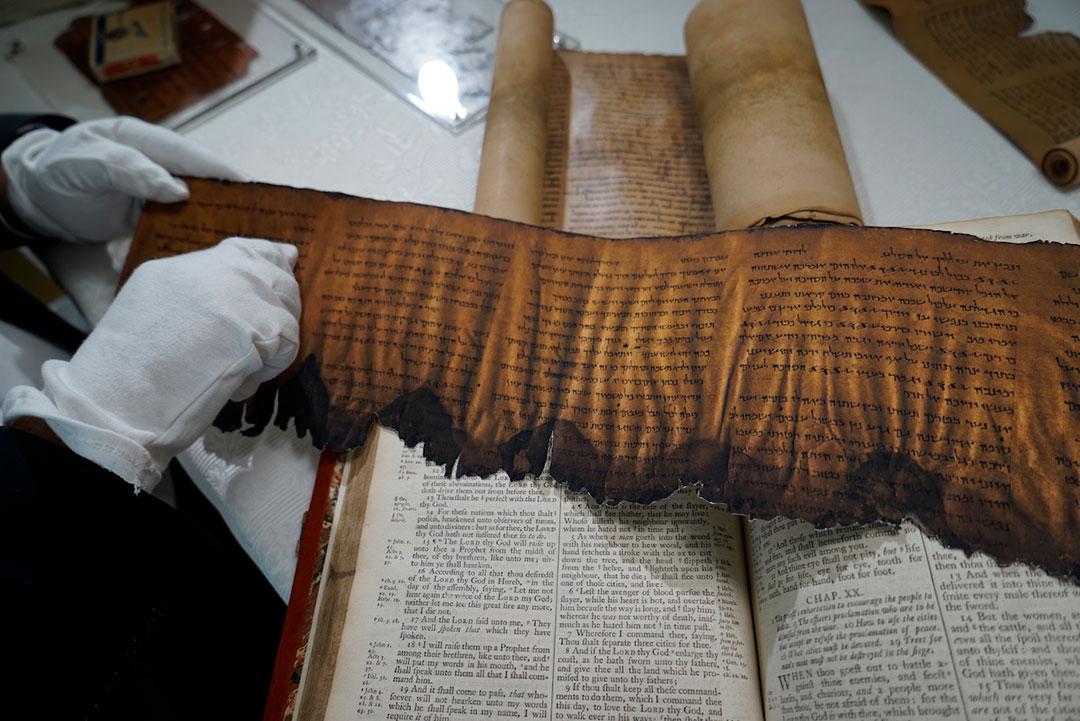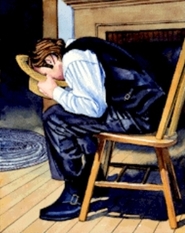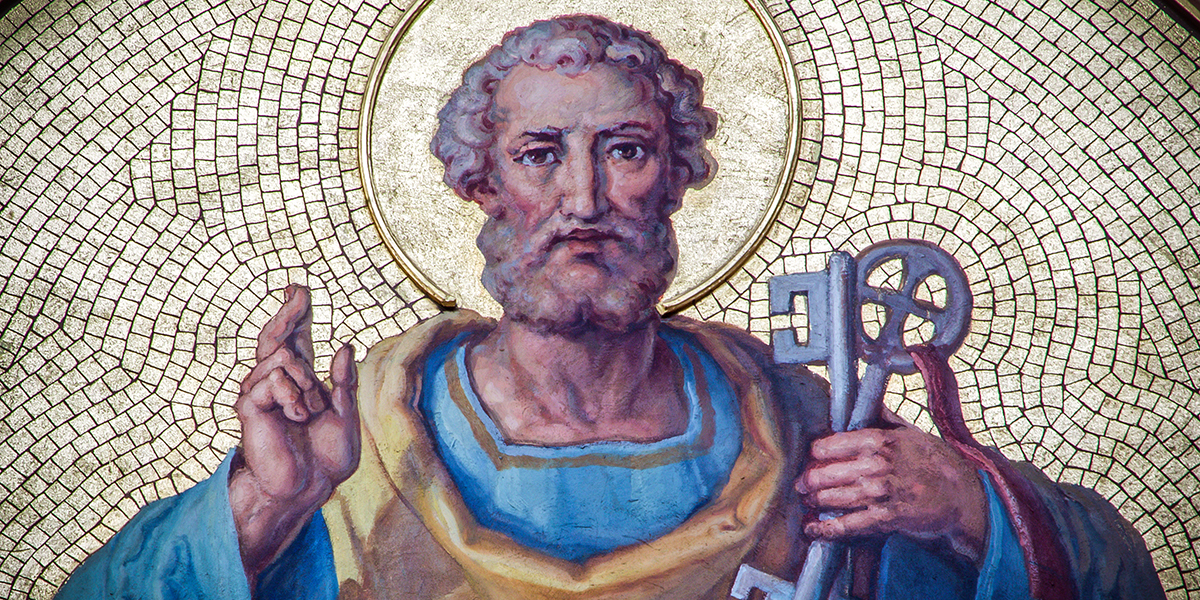Thursday, July 7, 2016
The Church's role in World War One
Prince, fame, and religious controversy
How did your Bible get to you?
Is Mankind "evolving" about homosexuality?
According to The Blaze, Christians are “evolving.” The story, based on the latest Pew religion poll, claims that, as a society, we are becoming more accepting of homosexuality, and The Blaze sees that as progress.
About Time, part 5: Carbon-14, the Ice Age, and the Bible
For many who call themselves Christians, 'Take it on faith' is a mantra they use when they can't explain something. But in fact, faith should be built on evidence.
Who decides right and wrong?
About Time, Part Four: Language – Science versus the Bible
In previous columns in this series, we’ve looked at the creation account versus the Big Bang, the Exodus account and biblical skeptics, and the biblical record of Israelite history versus the historical records of those nations around them. No discussion about the claims of the Bible versus the claims of science and history would be complete without looking at human speech.
Why won't racism go away?
About Time, Part Three: The Bible and the Big Bang
About Time, Part Two: Bible history versus secular history
About Time: Chronology and Bible skeptics
Should the Exodus be re-dated?
Last week I got to attend the premiere of a new film, “Patterns of Evidence – Exodus.” I can safely say it was the exact opposite of the last movie I reviewed, “Noah.”
Government, Parental Rights, and medical treatment
Evils of religion Part 11: Brigham Young and the Mountain Meadows Massacre
Evils of religion Part 10: The Missouri Mormon wars
Evils of religion Part 9: How a sexual predator became a spiritual leader
Evils of religion Part 8: The scam that became Mormonism
Evils of religion Part 7: Protestantism's present-day scandals
Despite ‘protesting’ some of the Catholic Church’s false teachings, they held onto:
- Catholicism's trinity (which changes God from a single Almighty to a board of directors)
- Hellfire (which makes God more cruel than Hitler)
- Immortality of the soul (which makes God a liar – after all, God told Adam and Eve they would “positively die” if they disobeyed Him. It was Satan who told Eve: “You positively will not die.”)
Protestantism added a confusing belief to what they received from Catholicism: Once Saved Always Saved. Confusing because, for centuries they tried – and some still try – to scare people into obedience with Hellfire. If you're saved, if you can be instantly saved by claiming you've accepted Jesus, why worry about hellfire?
With the coming of the free love generation in the Sixties many decided that God accepts everyone no matter what, contrary to what the Bible says in several places. (Matthew 24:13; John 3:36; John 15:13,14; Hebrews 3:14; 1 Corinthians 9:27; 1 Corinthians 10:12.)
The serial killer Son of Sam was ‘saved’ four years before he shot 13 victims in 1976 and 1977. Every president since Kennedy has claimed to be 'saved'. A good friend of mine said she 'got the call' and went down front in church and was ‘saved’ three times before it finally occurred to her that what she was feeling was coming from her own emotions, not the holy spirit.
Protestants have also adorned their clergy with pompous titles and garb. They may call their pastors ‘Reverend’ rather than ‘Father,’ but they can’t show you any scriptural foundation for the term. Only once do Protestants find in their version of the Bible the word “reverend” and that's in reference to God: “Holy and reverend is his name. The fear of Jehovah is the beginning of wisdom.” (Psalms 111:9, 10, ASV)
Furthermore, creating a paid clergy, and a clergy/laity distinction, engenders in the laity the belief that they can pay others to fulfill their obligation to defend their faith and spread the gospel. (1 Peter 3:15) Much more sinister, however, is that it creates in the clergy a belief that they are above the standards of conduct to which the rest of us are held.
Protestantism has a lot to answer for.
Calvinism’s predestination teaching was responsible for “Manifest Destiny,” the doctrine that justified Europeans expanding across America, Africa, and Australia, wiping out native tribes. It must accept the blame for America’s early history of slavery, as well as the apartheid movement that plagued South Africa until just a couple decades ago. Calvin's teaching spawned the idea that is still going strong: that God predestined white people to be superior to people of other races.
Perhaps most insidious is this: People with no Bible knowledge see a TV preacher waving a Bible and they assume that the racist, immoral actions of those oh-so-pious religionists must be based on that book. Catholicism at least admits their teachings are based on tradition more than on scripture.Unlike Catholics, Protestants have been the first to jump on every unscriptural fad that has come along: The U.S. census reported that couples living together without marrying jumped 700 percent from 1960 to 1970. Subsequently the Anglican Church, instead of upholding the Bible’s standard, announced in 1980 that objections to people living together without benefit of marriage should be dropped. Other Protestant religions soon followed. Next, the Protestant churches started lining up to approve same-sex marriage and homosexual clergy. The 'United' Methodist Church recently became sorely disunited when it decided to approve of same-sex marriage, and large numbers of their churches broke from them.
Even the teflon reputation of the Pope of Protestantism, Billy Graham, has taken its share of hits.
- While he bragged in his revivals about tearing down racial barriers he endorsed racist Price Daniel in his run for Governor of Texas. Graham claimed to be close friends with Martin Luther King, but when King came out in opposition to Vietnam, Graham castigated him for criticizing American foreign policy.
- On Good Morning America in 1991, when asked about abortion he replied, “There is a Christian position, I think, but I’m not prepared to say what it is.” Ahh, leadership!
- The IRS launched an investigation of Billy Graham’s $100,000,000 organization after they ran ads in 2012 urging voters to “consider candidates who make decisions based on biblical principles and support of the nation of Israel.” A couple years later, the organization changed its IRS status from "non-profit" to "church". A seemingly small change, but non-profits are subject to IRS investigation; churches are not.
- His son, Franklin Graham, reportedly receives a yearly salary of $1.2 million. Due to his recent sex scandals and loud support of Trump, a petition for his removal from the organization has received over 22,000 signatures.
- Jimmy Swaggart’s ‘ministry’ has bounced back nicely from his highly publicized adulterous prostitute/masturbation humiliation back in 1988. An insider claims Swaggart Ministries pulls in $2 million a month from duped donors. A ministry-funded printing facility takes on lucrative commercial printing jobs on the side, including posters for local night clubs and CD labels for foul-mouthed hip-hop artists. The ‘two-bedroom cottage’ he frequently mentions in his sermons is actually a gold-fauceted, 9,337 square foot mansion on 20 landscaped acres – the most expensive residence in Baton rouge. He was the inspiration of the Ray Stevens song, “Would Jesus wear a Rolex?”
- Pat Robertson’s net worth is estimated to be somewhere between two hundred million and a billion dollars. His involvement in politics – including running for President – is well-known. Less well known is his support of Zaire dictator Mobutu and Liberian dictator Charles Taylor, both guilty of war crimes and gross human rights violations. In 2007 he pronounced that God had told him that millions of Americans would die in a terrorist attack before the year was out. Apparently God was wrong, but Robertson still has millions of worshipers.
- Benny Hinn’s ‘healing’ ministry collects more than $200 million a year. He has a private jet and a $10 million mansion. If he really can heal people, as he claims, why doesn’t he simply start clearing out hospitals?
- Kenneth Copeland also flies around the country in a $20 million private jet. He owns the airport where it lands and lives in a mansion the size of a hotel. When asked by congress to cooperate in an investigation of his financials his reply was, “Go get a subpoena.”
- Jesse Jackson turned his former gig as part of Martin Luther King's inner circle into a net worth of $10,000,000. He was booed at a protest in Ferguson, Missouri, when he turned up not to offer comfort to the mourners but to beg for money.
- Al Sharpton, another media whore, has a net worth of $5 million. Like Jesse Jackson, while he claims to be a Baptist preacher, virtually all his time in the spotlight is devoted to race, not the Kingdom.
- Most of the ‘flock’ of Charles Blake’s Pentecostal Church lives in poverty in South Central Los Angeles. But it’s a big flock, and his annual salary is $900,000. He lives in Beverly Hills, not South Central.
Evils of religion Part 6: The brutality of the early Protestants
Evils of religion part 5: Catholicism's worst atrocities
Evils of religion, part 4: The lie about the unbroken chain of popes
Evils of religion, part 3: Catholicism's lies about Peter and early popes
Evils of religion, part 2: Was Peter 'the rock', the first pope?
Evils done in the name of Religion: Part 1, Catholicism
No religion has a monopoly on evil
“Faith is believing what you can’t prove.”
- Jesus taught, ‘The meek shall inherit the earth.’ (Matthew 5: 5) [The Church teaches that the meek will inherit heaven.]
- Jesus said, ‘Call no man on earth father.’ (Matthew 23:9) [The Church insists on calling its clergy “Father.”]
- Jesus taught that if your church is the majority, it is wrong. ‘Go in through the narrow gate, for wide is the gate and broad the way that leads to destruction, and many are they who enter in through it.’ (Matthew 7:13) [The Church believes their being largest makes them the true faith.]
- Jesus said he was the only way to his father. ‘No one comes to the father except through me.’ (John 14:6) [The Church teaches its followers to approach God through various ‘saints.’]
- Jesus taught his followers to reject warfare. ‘All who draw the sword will die by the sword.’ (Matthew 26:52) [The Church has a sordid history of preaching her followers into wars, not talking them out of it.]
- Jesus said, "This cup is the new Covenant ratified by my blood which is to be poured out on your behalf.”’(Luke 22:20) [While the Greek in Matthew 26:27 has Jesus saying ‘this cup is my blood’ he no more meant that the wine in the cup was literally his blood than that the cup was literally a covenant. The cup was a cup, the wine in it was wine. But the Church teaches that the wine in the cup literally changes into Jesus’ actual blood.]
- Jesus said, ‘Any man who divorces his wife for any cause except her unfaithfulness, and marries another woman, commits adultery.’ (Matthew 19:9) [The Church does not permit divorce on any grounds, even unfaithfulness.]
- Jesus taught, ‘If you were of the world, the world would love its own. But because you are not of the world, I having selected you from the world, the world hates you.' (John 5:19) [The Church loves the world, is up to her elbows in the world, believing she can fix it from within. The pope even polled the world to find out what teachings his Church should change.]
Are things actually getting better?
"Things have always been this way!"
The UN’s coming attack on Religion, Part 3
In Part One we discussed the unprecedented move of the UN not only in castigating the Catholic Church for hiding its pedophile priests instead of protecting children, but going beyond that and criticizing their doctrines on homosexuality, abortion, celibacy and birth control. It ended with the question, Does the UN have any teeth?
The UN and religion, Part 2
Is the UN a paper tiger? Does it have any teeth?
It is not an academic question. There will come a time when it will need teeth.
A Texan might describe the UN as 'all hat and no cattle.' Sometimes it seems like they can't agree on when to break for lunch. Since its inception the General Assembly has passed over 14,000 resolutions. Unfortunately, nearly all of them have been “non-binding.”
So basically they are suggestions.
The Security Council is different. Their edicts have teeth. They have 15 members, 5 of which are permanent members: France, Russia, England, China, and the U.S. The other 10 are filled in rotation by General Assembly members. Only the “Permanent 5” have veto power.
For most of its existence, that has meant deadlock: nearly everything the U.S wanted Russia vetoed, and vice versa. But not always.
In the summer of 1950 the ambassador from the Soviet Union boycotted the UN because of its refusal to admit Communist China. The U.S. used that absence to pass a resolution and, on June 25, the Security Council began sending UN troops to Korea.
The incident prompted the General Assembly to pass resolution 377-A. 377-A states that, in cases where the Security council is deadlocked in a crisis, the General Assembly may issue any recommendations it deems necessary to restore peace and security.
Since that time, the UN has sent blue-helmet-wearing soldiers on 60 missions, 16 of which are still ongoing. 10 years ago, 36,000 military personnel wore the blue helmet. Last year, over 100,000 did.
The UN doesn’t have a standing army. When they need troops, they borrow them from members. There are two problems with this arrangement:
- Response time: Countries are slow to supply the promised troops – 4 to 6 months, typically; not a good thing in an emergency.
- Loyalty. Borrowed soldiers tend to be loyal to their own country first, to the blue helmet second.
One solution the UN has tried is hiring mercenaries, contractors such as Halliburton or Blackwater. These names may be familiar to you. They have been in the news for their less than ethical record in conflicts in Afghanistan, Iraq and other places.
There have been instances of these ‘security employees’ kidnapping, torturing, even murdering both combatants and innocent bystanders. When the crimes came to light, their bosses whisked the offenders to another country.
Loyalty is an even bigger problem with mercenaries than with rank and file soldiers. A mercenary’s first loyalty is to his paycheck. His second is likely to his own country. Loyalty to the UN, if it exists at all, would be far down the list.
The UN’s ‘working group’ on mercenaries has, for the past 10 years, been consistently recommending against hiring mercenaries, at least until a mercenary code of conduct is agreed to. Though that issue is still not resolved, they continue to employ mercenaries.
If borrowed soldiers are too slow, and mercenaries are unethical, what is the solution? Many members of the UN believe the solution is for the UN to have its own standing army: soldiers whose loyalty is not to a paycheck, nor to their birth country, but to the UN itself. Watch the news for developments on that front. (Revelation 17:12)
Now, what does any of this have to do with the UN attacking religion?
The UN has a love/hate relationship with religion. They refer to them as FBOs – faith-based organizations.
From the beginning, religion has lent legitimacy to the UN. After World War One, Pope Benedict XV pushed for the creation of the predecessor to the UN, the League of Nations. The Federal Council of Churches of Christ in America went so far as to suggest that the League would be a better peacemaker than God’s Kingdom. Since then, various popes have said:
- “If ever an assembly of men, gathered at a critical crossroad in history, needed the help of prayer, it is this Assembly of the United Nations.” – Pius XII
- It is a “duty of all peoples to accept the autonomous force of the United Nations as an international police.” – John XXIII
- “This organization represents the obligatory path of modern civilization and of world peace.” - Paul VI
- The UN is “the supreme forum of peace and justice.” – John Paul II
- “My presence at this Assembly is a sign of esteem for the United Nations.” - Benedict XVI
- “I look forward to continuing cooperation between the United Nations and the Holy See, under the wise leadership of His Holiness Pope Francis.” – UN Secretary-General Ban Ki-moon
Another reason the UN loves FBOs is that they are better suited for humanitarian aid. They are often first on the scenes of disasters with medical care, food and water… the UN simply doesn’t do anything fast enough to be useful in an emergency.
But: the UN also hates FBOs. They refer to governments based on a religious text, such as the Koran, as “theocracies,” and they don’t mean that in a good way. They mean that theocracies such as Iran, as opposed to Magna Carta-based governments, are radical and difficult to reason with. In the last year, the UN’s news agencies have pointed out that:
- Christians are slaughtering Muslims in Central African Republic
- Muslims are slaughtering Christians in Pakistan
- Sunni Muslims are slaughtering Shia Muslims in Iraq
- Muslims and Catholics are slaughtering each other in the Philippines
- Buddhists and Muslims are slaughtering each other in Myanmar
- Muslims and Coptic Christians are slaughtering each other in Egypt
A recent study showed that fully one third of the world’s governments, comprising 75% of the world’s population, severely restrict religion. Worldwide, religious hostilities are up 24% since 2011.
Another reason the UN hates FBOs: FBOs meddle. If a special interest group can’t get the laws they want at a national level – issues such as abortion rights, birth control, same-sex marriage, drugs, stem cells – they dub themselves an FBO and take their case to the UN.
In 2008, after studying the problem for several years the UN created an agency called Global Interfaith Network for Population and Development that brought together over 400 different FBOs.
It’s getting out of control. And, as noted in Part 1 of this series, pendulums always swing back. Some in the UN are beginning to see that their faith in Faith-Based Organizations was misplaced. They argue that “religion is too contentious and should not be involved in public life,” and cite the many UN representatives that have been killed in the Middle East, Africa and other trouble spots in the name of “religion.”
There’s another UN-linked threat to religion: The growth in funding for FBOs is threatening the NGOs – non-governmental organizations, such as Red Cross, Red Crescent, and women’s rights groups, that have had influential and lucrative partnerships with the UN. As the FBOs start impacting the NGOs pocketbooks, we should expect to see NGOs lobbying for the UN to turn a cold shoulder to religion.
Finally, the latest accusation is that more than 70% of the NGOs and FBOs working with the UN are ‘Christian.’ So now Muslim, Hindu, Buddhist, and Jewish organizations are pressuring the UN to correct what they perceive as a bias toward Christian programs.
Can you see how one or more of these issues might finally drive the Secretary General of the U.N. to step up to the microphone and order the destruction of religion, similar to what I fictionalized in my novel Resurrection Day.
Okay, so maybe it won’t happen
exactly like that. But, as we’ll see in the final part of this series, it will happen…
Read Part One of this series.
Read another of my columns about the U.N.
Bill K. Underwood is the author of several novels and one non-fiction self-help book, all available at Amazon.com. You can help support this site by purchasing a book.




























